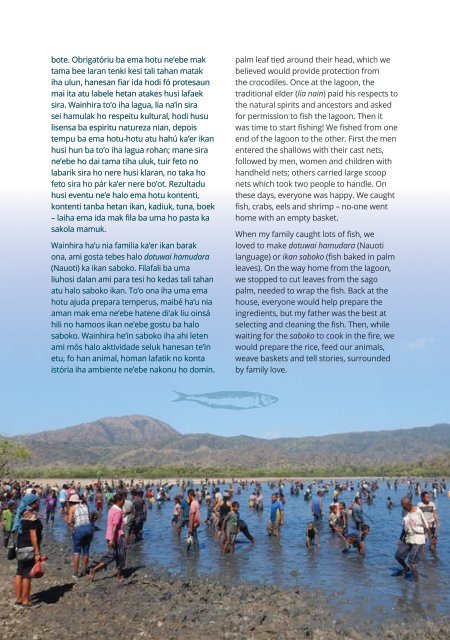You also want an ePaper? Increase the reach of your titles
YUMPU automatically turns print PDFs into web optimized ePapers that Google loves.
ote. Obrigatóriu ba ema hotu ne’ebe mak<br />
tama bee laran tenki kesi tali tahan matak<br />
iha ulun, hanesan fiar ida hodi fó protesaun<br />
mai ita atu labele hetan atakes husi lafaek<br />
sira. Wainhira to’o iha lagua, lia na’in sira<br />
sei hamulak ho respeitu kultural, hodi husu<br />
lisensa ba espiritu natureza nian, depois<br />
tempu ba ema hotu-hotu atu hahú ka’er ikan<br />
husi hun ba to’o iha lagua rohan; mane sira<br />
ne’ebe ho dai tama tiha uluk, tuir feto no<br />
labarik sira ho nere husi klaran, no taka ho<br />
feto sira ho pár ka’er nere bo’ot. Rezultadu<br />
husi eventu ne’e halo ema hotu kontenti,<br />
kontenti tanba hetan ikan, kadiuk, tuna, boek<br />
– laiha ema ida mak fila ba uma ho pasta ka<br />
sakola mamuk.<br />
Wainhira ha’u nia familia ka’er ikan barak<br />
ona, ami gosta tebes halo dotuwai hamudara<br />
(Nauoti) ka ikan saboko. Filafali ba uma<br />
liuhosi dalan ami para tesi ho kedas tali tahan<br />
atu halo saboko ikan. To’o ona iha uma ema<br />
hotu ajuda prepara temperus, maibé ha’u nia<br />
aman mak ema ne’ebe hatene di’ak liu oinsá<br />
hili no hamoos ikan ne’ebe gostu ba halo<br />
saboko. Wainhira he’in saboko iha ahi leten<br />
ami mós halo aktividade seluk hanesan te’in<br />
etu, fo han animal, homan lafatik no konta<br />
istória iha ambiente ne’ebe nakonu ho domin.<br />
palm leaf tied around their head, which we<br />
believed would provide protection from<br />
the crocodiles. Once at the lagoon, the<br />
traditional elder (lia nain) paid his respects to<br />
the natural spirits and ancestors and asked<br />
for permission to fish the lagoon. Then it<br />
was time to start fishing! We fished from one<br />
end of the lagoon to the other. First the men<br />
entered the shallows with their cast nets,<br />
followed by men, women and children with<br />
handheld nets; others carried large scoop<br />
nets which took two people to handle. On<br />
these days, everyone was happy. We caught<br />
fish, crabs, eels and shrimp – no-one went<br />
home with an empty basket.<br />
When my family caught lots of fish, we<br />
loved to make dotuwai hamudara (Nauoti<br />
language) or ikan saboko (fish baked in palm<br />
leaves). On the way home from the lagoon,<br />
we stopped to cut leaves from the sago<br />
palm, needed to wrap the fish. Back at the<br />
house, everyone would help prepare the<br />
ingredients, but my father was the best at<br />
selecting and cleaning the fish. Then, while<br />
waiting for the saboko to cook in the fire, we<br />
would prepare the rice, feed our animals,<br />
weave baskets and tell stories, surrounded<br />
by family love.<br />
98<br />
Te’in ikan no hahán tasi iha Timor - <strong>Leste</strong>

















